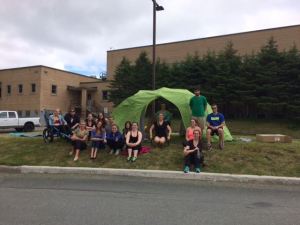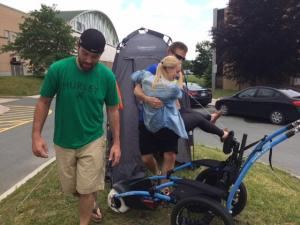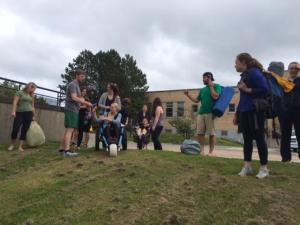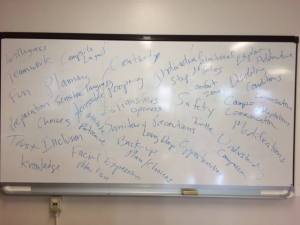We are half way! It is hard to believe just how fast time is pass-by this summer. In the morning portion of our class we were given disabling conditions from here we were given a list of fourteen questions for us to respond to. I selected Attention Deficit Hyperactivity Disorder (ADHD) for the condition i will be writing about. I felt that with my experience in working with youth for over six year I have encountered my fair share of person(s) with this condition. Typically you will find that those whom do you come in contact with are medicated but this is never broadcasted. With ADHD there is a significant amount of stigma surrounding this as well those who will use certain medication prescribed to those with this different in order to study i.e., Ritalin due to the pressure that students today are faced with to achieve marks in order to progress to the almighty Masters programs and/or Ph.D. I have found that Macleans has a well written article about this topic http://www.macleans.ca/education/uniandcollege/brain-candy-can-ritalin-turn-you-into-an-a-student/
Sara Harris speaks about the importance of using nature as a tool to nurture people in her role as a psychotherapist. I feel like nature could be utilized to assist someone with ADHD as nature can appeal to all five sense at once. The calmness of nature can calm one’s sensibilities in an instance. For example Sarah Harris speaks of one client “an angry man remembered the serenity of a boyhood lake at sunrise and was able to draw on this memory to calm himself (p. 88, 2009)”. It is all about changing the client’s state of mind. In this example if you can shift the clients angry thoughts to a calmness of a boyhood lake, you have successfully changed his state. The priority being to try to assist the client to independently shift his focus to nature to calm himself if he has angry tendencies or in this case ADHD.
The following is information, which I found regarding ADHD as part of our class activity. Please note, the information that I have provided is now my own research.
What is Attention Deficit-Hyperactivity Disorder?
o According to the National Institute of Mental Health Attention deficit hyperactivity disorder (ADHD) is one of the most common childhood disorders and can continue through adolescence and adulthood. Symptoms include difficulty staying focused and paying attention, difficulty controlling behavior, and hyperactivity (overactivity).
o http://www.nimh.nih.gov/health/topics/attention-deficit-hyperactivity-disorder-adhd/index.shtml
What are some common medications used to treat Attention Deficit-Hyperactivity Disorder?
o According to Teen Health Organization there are two types of medical treatments a stimulant medication and a non-stimulant. Stimulant medications include Concerta, Ritalin LA, and Focalin to name some. Non-Stimulant medications include Strattera, Intuniv, Kapvay, and Wellbutrin.
o http://kidshealth.org/teen/drug_alcohol/drugs/ritalin.html
Will Attention Deficit-Hyperactivity Disorder impair social functioning?
o Often person(s) with Attention Deficit-Hyperactivity Disorder can have mild impairment of social functioning
In order to aid in a child or youth life who has ADHD I would ensure that all activities are physically active yet are within an appropriate amount of challenge for the client. These activities could stem from Badminton to kayaking.
In our afternoon portion of the class we to ensure that we become more familiar with the outdoor pieces of equipment the faculty owns we were given a task – to take two people camping using the Hippocampus and Trail Rider. To simulate this task, we set up a tent, and washroom house. With each task we ensured that the two people in both pieces of equipment felt included and were properly treated. In saying this, during our debriefing the two individuals whom were in these chairs felt they could have done more. I find this is interesting, as we do not want to overwhelm them with task, but it is great that they felt that they were able to contribute to further tasks. I feel camping serves as a therapeutic benefit not only for the client but everyone who is involved. Once you are away from the city surrounding where you do not hear the sirens from emergency vehicles, or the consistent notification from your smartphone this is automatically puts ones stress levels in a lower position than before.
In conclusion, I feel that it is essential that everyone experiences leisure in nature, which is free from daily life distractions and stressors.
Kind regards,
Ryan Lawlor
Sources:
Buzzell, L., & Chalquist, C. (Eds.). (2009). Ecotherapy: Healing with nature in mind. Sierra Club Book: San Francisco, CA





